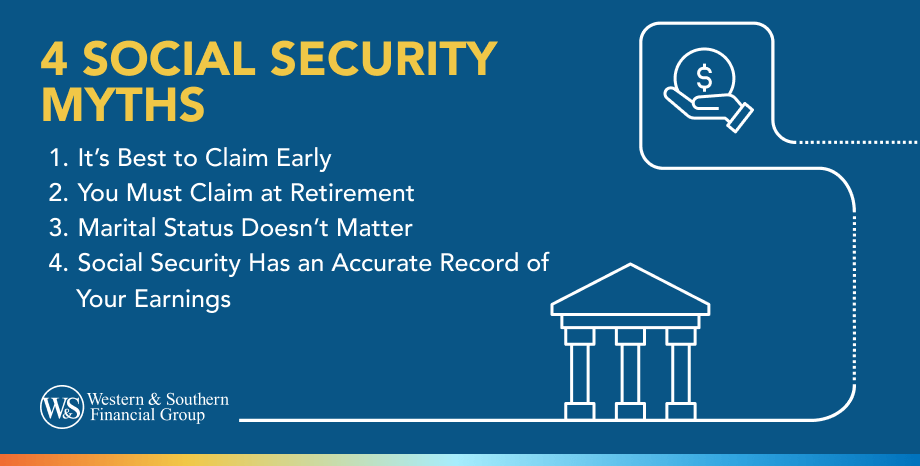

Table of Contents
Key Takeaways
- Claim Social Security at 62 for early benefits, but waiting until full retirement age yields the full monthly amount, and waiting until 65 provides about 93.3% of the benefit.
- Delaying benefits past retirement age increases monthly amounts, with claiming at 67 offering 108% and waiting until 70 resulting in 132% of the benefit.
- Marital status matters for benefits, as spouses can get up to 50% of their partner's benefit, and divorced individuals may qualify too.
- Social Security's earnings record may be inaccurate, so regularly review your history and correct errors within a specific timeframe to ensure accurate future benefit calculations.
Social Security, initiated in 1935 during the Great Depression, helps offer financial protection to aging and unemployed Americans through payroll-funded monthly benefits, determined by full retirement age and lifetime earnings. It was a response to widespread poverty and is integral to retirement planning.1
Several misconceptions still surround Social Security — even though the program has existed for over 80 years. Here are some of the most common Social Security myths and the truth behind them.
Myth #1: It's Best to Claim Early
Fact: The earliest you can claim Social Security benefits is age 62. However, if you want to collect 100 percent of your monthly benefit, you have to wait until you reach your full retirement age, which will depend on the year you were born.2 For instance, if you were born between 1943 and 1954, your full retirement age is 66.3 If you collect benefits at age 62, you'll receive 75 percent of what you're entitled to at your full retirement age. At age 65, you'll receive about 93.3 percent of your monthly benefit.
Myth #2: You Must Claim at Retirement
Fact: While experts often cite 65 as the retirement age for employment purposes, some people continue to work past retirement age for a variety of personal or financial reasons.
If you're one of them, this could benefit you when it comes to Social Security. Delaying your benefits will increase the monthly amount you get when you eventually claim your entitlement.4 For example, if you were born between 1943 and 1954, your full retirement age is 66. If you don't begin collecting Social Security until age 67, you'll receive 108 percent of the monthly benefit to which you're entitled. If you wait until age 70, that percentage jumps to 132 percent. As of lately, you can delay taking Social Security until age 70.
Myth #3: Marital Status Doesn't Matter
Fact: Marriage has several financial benefits within the Social Security system.5
Spouses can get up to 50 percent of their husband's or wife's Social Security benefit. Even if you've never worked or contributed payroll taxes to the Social Security program, you may be able to collect benefits if your spouse currently collects them and you're at least 62.
If you're entitled to receive monthly Social Security benefits because you worked, you still can qualify to receive spousal benefits. If your spousal benefits are higher than what you'd get on your own, the Social Security Administration gives you a combination of benefits that totals the higher amount you'd get as a spouse. Another important point: You can collect spousal benefits even if you're divorced. You're eligible in this case if your former spouse is entitled to Social Security, if you were married for at least 10 years, if you're currently unmarried and at least 62 years old, and if the amount you would receive based on your own lifetime earnings is less than what you'd get as a spouse.
Whether you're divorced or still married, the same rules apply if you begin drawing Social Security benefits early. If you do so between age 62 and full retirement age, you won't get 100 percent of your benefit.
Myth #4: Social Security Has an Accurate Record of Your Earnings
Fact: Unfortunately, this isn't always true. To get a better picture of your earnings history, create an account on the Social Security website.6
Once you do, you can access regular statements, review your earnings history and get estimates of your future monthly benefit. Social Security calculates monthly benefits based on your lifetime earnings and your average monthly earnings during the 35 years you earned the most, so if you notice any inaccuracies, contact the agency or your local Social Security Office to correct the information. You have up to three years, three months and 15 days after the calendar year in which you received the earnings to correct the record.7
Using Social Security to Your Benefit
Misconceptions shouldn't keep you from collecting all the Social Security benefits to which you're entitled. As you approach the end of your working years, these benefits could add extra financial cushion on top of your other retirement savings. If you've spent your lifetime working — or have a spouse who has contributed to Social Security — you deserve to collect this money, and it may be important for you as you near or enter retirement.
Sources
- Historical Background And Development Of Social Security. https://www.ssa.gov/history/briefhistory3.html.
- You Can Receive Benefits Before Your Full Retirement Age. https://www.ssa.gov/benefits/retirement/planner/applying2.html.
- If you were born between 1943 and 1954 your full retirement age is 66. https://www.ssa.gov/benefits/retirement/planner/1943.html.
- If you were born between 1943 and 1954 your full retirement age is 66 - Delayed Retirement. https://www.ssa.gov/benefits/retirement/planner/1943-delay.html.
- Benefits For Your Family. https://www.ssa.gov/benefits/retirement/planner/applying7.html.
- Social Security Administration. https://www.ssa.gov/.
- Social Security Handbook. https://www.ssa.gov/OP_Home/handbook/handbook.14/handbook-1423.html.














